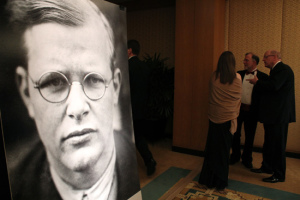What we can learn from the 'COVID class' of 2024

The graduating class of 2024 has had a unique experience. Some of them call themselves “the COVID class.” Names matter, and I don’t love that name, but I understand it. COVID robbed them of their high school prom, a senior trip, and a normal high school graduation. For many of them, even their college experience started online.
Yet now they are joining the ranks of college graduates. Truly, there is much to celebrate. We can take inspiration by noticing what helped them be resilient and cross the graduation finish line.
No doubt, things beyond their control shaped their college experience, but successful students recognized they were actors in their own stories too. That’s wisdom that it takes some a lifetime to learn.
They recognized they had choices to make, and they chose to attend to the needs of their hearts, minds, and souls.
First, the heart. The class of 2024 chose to value relationships, especially face-to-face relationships. A lot has been said in recent years about college students not having real relationships because they are online too much. However, I have observed that this class has made an important shift.
There is wisdom expressed in a line from an old Joni Mitchell song: “You don’t know what you’ve got ‘til it’s gone.” For the class of 2024, face-to-face interactions were gone for so long during a critical period of their lives it’s led them to treasure relationships and really value spending time together.
They have chosen well. Study after study confirms that relationships make a huge difference in the quality of personal and professional life, emotional well-being, physical health and longevity, and in the ability to make it through hard times. That heart for relationships is so needed today. The Surgeon General recently issued an advisory on the epidemic of loneliness and isolation, noting nearly half of US adults report loneliness. And while loneliness rates are up, empathy rates are down, and polarization and conflict are at such high levels. The world needs people who choose to value relationships. We need those who choose to be bridgebuilders. We need a greater heart for relationships, more empathy, and an increased concern for the other.
Second, the class of 2024 has chosen to attend to their minds. They've obviously stretched their mind at college by studying and succeeding academically. They have also chosen to accept the reality that life really is hard sometimes, but that learning, adapting, and growth are still possible.
Carol Dweck calls this “a growth mindset” and has an extensive body of research demonstrating that it is a game changer — when we refuse to act like our abilities are completely fixed and instead say, “I can grow. I can learn. I will figure this out. I can do hard things.” The class of 2024 has done that. They've chosen not to give up. They've pivoted over and over again.
They learned to take college-level classes on Zoom, figured out how to develop real friendships with Zoom classmates, and managed to keep up with classes, even in COVID quarantine or isolation. Pivot after pivot, choice after choice after choice, they found a way.
This ability to adapt and problem-solve has uniquely equipped this graduating class with real-life skills that will help them immensely, both professionally and personally. Their refusal to accept that there is nothing they can do about great challenges, will undoubtedly help the class of 2024 personally and professionally and allow them to make a difference in their communities and the world.
Finally, the class of 2024 has chosen to attend to matters of the soul. For many in the class of 2024, it’s their belief in God or something bigger than themselves that gave them the hope to move forward even in difficult times. Research confirms this, too, is a wise choice. Moments of awe can help cultivate a spiritual life.
Dacher Keltner defines awe as “the feeling we have when we encounter vast, mysterious things.” He notes it can be experienced by being in nature, appreciating music or art, or even observing what he calls moral beauty — the extraordinary kindness, generosity or forgiveness of others. Students who tried to make a positive difference in the darkness of this world but also attended to the awe-inspiring gifts that surrounded them are models for us all.
Congratulations to the class of 2024. You’re not the COVID class. You are the overcomers. You inspire us all.
May we all follow the example of the class of 2024 and choose to attend to our hearts, minds, and souls.
Connie Horton is vice president for student affairs at Pepperdine University and led the team that developed RISE — The Resilience-Informed Skills Education Program for college students.




























